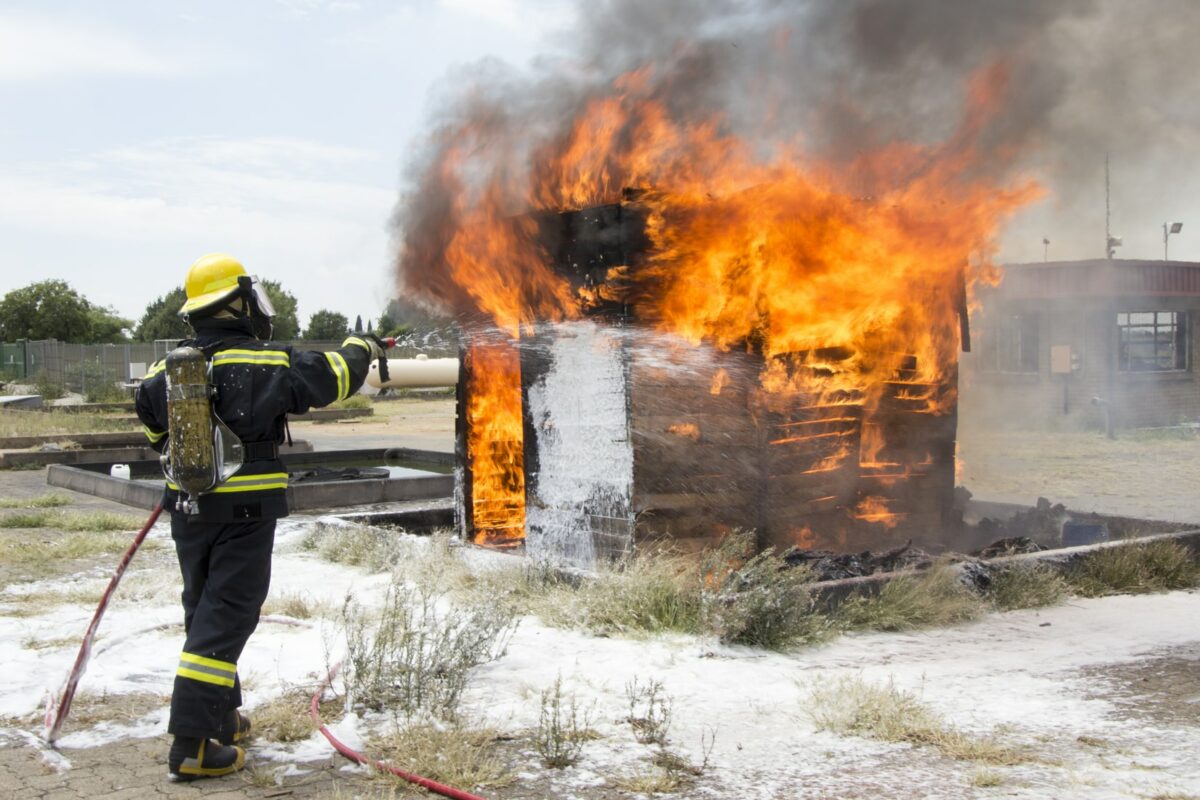Few people are more lauded and admired than firefighters, and rightly so. Every day, these extraordinary men and women put their lives on the line to save others. Their job not only involves rushing into burning buildings as everyone else runs out, they are often first on the scene of serious car accidents, natural disasters and yes, they really do rescue cats stuck up trees (although due to funding cuts they have pleaded with the public to make their first port of call the RSPCA)[1].
Although danger is part of the course of firefighting, there is a growing concern about industrial disease resulting from badly cleaned Personal Protective Equipment (PPE). A study conducted by researchers at the University of Central Lancashire, published in Nature’s Scientific Reports[2] looked at why cancer incidence appears to be higher amongst firefighters compared to the general population.
Studies were carried in two UK Fire and Rescue Service Stations (identified as Station 1 and Station 2), on the southern coast of England. Researchers took wipe samples from the hands, neck, and jaws of firefighters. Samples were also collected from PPE, workstations, and fire engines.
Levels of 16 polycyclic aromatic hydrocarbons (PAHs) that are produced by fires due to carbon combustion were taken. These PAHs were known or possible carcinogens, having been identified as such by the International Agency for Research on Cancer.
Toxicity values (also known as ‘cancer slope factors’) were applied, and the researchers concluded the firefighters had a ‘markedly elevated risk’ of cancer over a lifetime. The main route of exposure appeared to be through the skin.
UK behind the US, Canada and the Nordic countries when it comes to firefighters and cancer
Anna Stec, lead researcher on the study and professor in fire chemistry and toxicity at the University of Lancashire recently told Health and Safety Magazine:
“In the US and Canada, they have developed strategies to limit [firefighters] contamination from their work environment. We want to make sure firefighters have the best preventative medical care, education and support to reduce the risk of cancer and cardiovascular deaths.
The US and Canada are far ahead on this issue; even Norway and Finland have only taken action in the last five years. But in the UK, no research has been carried out to look closely at factors leading to firefighters’ cancers”.
The response to the research
The Fire Brigades Union has been extremely supportive of the research on the risk of cancer to firefighters and has stated it will “promote to employers the need to look after the kit and make sure it is cleaned properly”.
The Union also recognises that there have been other studies, cited by the University of Central Lancashire paper; one showing a possible increase in firefighters’ risk of contracting 12 different cancers. Another study by the US National Institute for Occupational Safety and Health examined 29,993 firefighters and saw clear evidence of an association between the profession and some digestive and respiratory cancers.
Claiming compensation for industrial disease in the firefighting profession
The increased risk of cancer and firefighting has been known for many years. For example, a number of successful compensation claims have been made by firefighters who tragically developed asbestos-related cancer, including mesothelioma, while performing their work.
If an employer has negligently exposed a worker to a harmful carcinogenic, which is known to be linked to certain types of cancers, that employee may be liable for compensation. To be eligible for compensation, you must be able to prove that your employer breached their duty of care owed to you, and you suffered an industrial disease as a result.
The Fire Brigades Union is also pursuing having the cancers relating to the firefighting profession be included under the Industrial Injuries Disablement Benefit Scheme. To qualify, the Industrial Injury Advisory Council must rule that firefighters are twice as likely to develop cancer as the general population.
Firefighters are the heroes of modern times. The Firefighters’ Compensation Scheme (England) Order 2006 and its subsequent amendments compensate firefighters who are injured in the line of duty (or their families if they are killed). However, disease can debilitate and kills firefighters too. If they become ill fulfilling the selfless execution of their duty, they and their families deserve to be compensated.
Saracens Solicitors is a multi-service law firm based in London’s West End. We have a multi-lingual and highly experienced personal injury law team who have the expertise required to advise and represent you if you wish to claim compensation. For more information, please call our office on 020 3588 3500.
[1] https://www.telegraph.co.uk/news/9385332/Dont-call-us-for-cats-stuck-in-trees-Fire-Brigade-warns.html
[2] https://www.nature.com/articles/s41598-018-20616-6
